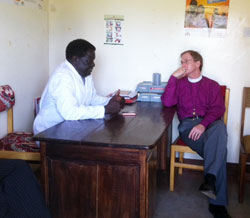 In the afternoon, I visit Beacon of Hope clinic, and talk with its director, Dr. Okwana, and his staff. We have high hopes this ten-bed clinic will evolve into a real hospital, and include a regional psychosocial trauma center covering northeastern Uganda and southern Sudan. Here they handle everything from infections to viruses, and undertake a lot of basic education in hygiene, pre- and post-natal care, and help families with the traumatic issues endemic to the rural poor.
In the afternoon, I visit Beacon of Hope clinic, and talk with its director, Dr. Okwana, and his staff. We have high hopes this ten-bed clinic will evolve into a real hospital, and include a regional psychosocial trauma center covering northeastern Uganda and southern Sudan. Here they handle everything from infections to viruses, and undertake a lot of basic education in hygiene, pre- and post-natal care, and help families with the traumatic issues endemic to the rural poor.
But the abiding enemy is malaria.
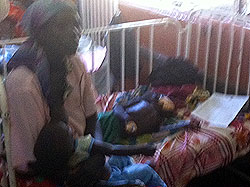 Down the hall lying on a cot is a woman afflicted with cerebral malaria. She alternates between delirium and unconsciousness. As I stand by her bedside, I can see another malaria patient with an IV drip, and two mothers with sick children. I remember some of the facts.
Down the hall lying on a cot is a woman afflicted with cerebral malaria. She alternates between delirium and unconsciousness. As I stand by her bedside, I can see another malaria patient with an IV drip, and two mothers with sick children. I remember some of the facts.
Uganda is the world’s youngest country and has the world’s highest malaria transmission rate. The number of children under five who die every year is unthinkable. On any given day, a third of the population is sidelined from their daily work because of malaria. Symptoms include blinding headaches, depression, respiratory distress, exhaustion and worse. Medicines are sometimes hard to come by, and the villages are exploited by quacks who promise “cures” that sometimes do irreversible harm.
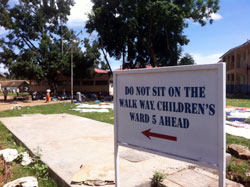 From the clinic, we visit the pediatric ward of Soroti Hospital. Built by the British, the hospital is antiquated, overcrowded and under-resourced. Many of the staff are incredibly dedicated, hardworking and knowledgeable people, but they just don’t have enough to be able to make a lasting difference. Over half of the kids in the beds are there with malaria. Many are listless and malnourished. Their mother’s faces are racked with worry.
From the clinic, we visit the pediatric ward of Soroti Hospital. Built by the British, the hospital is antiquated, overcrowded and under-resourced. Many of the staff are incredibly dedicated, hardworking and knowledgeable people, but they just don’t have enough to be able to make a lasting difference. Over half of the kids in the beds are there with malaria. Many are listless and malnourished. Their mother’s faces are racked with worry.
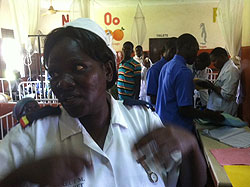 Sister Margaret, the nurse who runs the ward, shows us around. I ask permission to take a few pictures, and I do.
Sister Margaret, the nurse who runs the ward, shows us around. I ask permission to take a few pictures, and I do.
It isn’t until later, as I’m looking at their pictures, that I think to pray for these children, and their mothers. And as I do, along with their faces, I see the faces of some of the healthy kids I have gotten to know in our parishes back in Pittsburgh. I give thanks to God that they don’t have to go through anything like this, and I pray that one day children here in Teso will enjoy the same blessing of health.
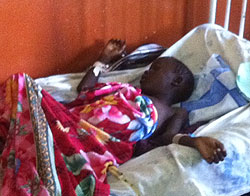 Pilgrim wants to eliminate malaria. We did so for 177,000 people through a comprehensive pilot protocol in the district of Katakwii, in 2008. We’re now planning with the Global Fund and the Ministry of Health to do the same across the northeast of Uganda. For more information on malaria and how Pilgrim is fighting it, go to our website, www.pilgrimafrica.org.
Pilgrim wants to eliminate malaria. We did so for 177,000 people through a comprehensive pilot protocol in the district of Katakwii, in 2008. We’re now planning with the Global Fund and the Ministry of Health to do the same across the northeast of Uganda. For more information on malaria and how Pilgrim is fighting it, go to our website, www.pilgrimafrica.org.
